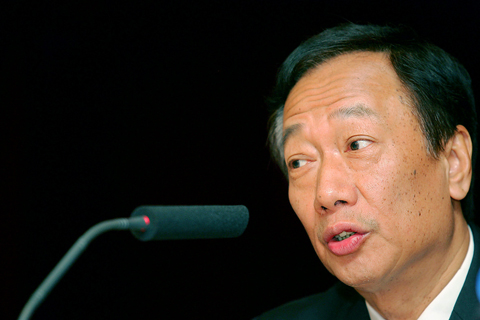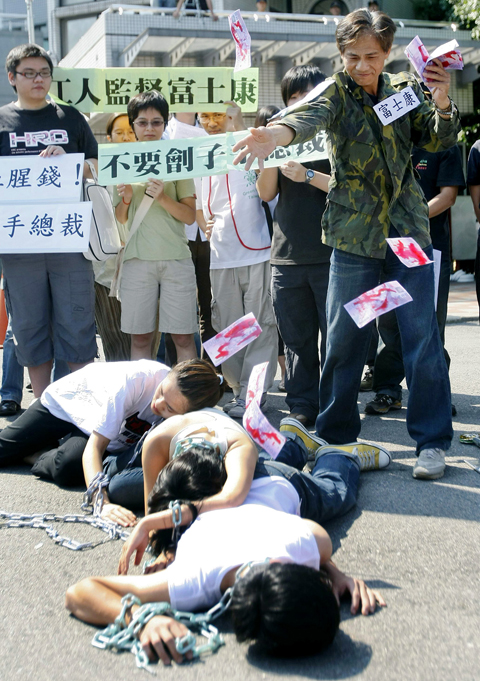Foxconn International Holdings (富士康) said it will seek higher prices from its clients to help offset wage hikes at a plant in southern China that has been hit by a series of suicides.
Meeting shareholders in Hong Kong for the first time since the deaths, executives at Foxconn, owned by Hon Hai Precision Industry Co (鴻海精密), said the company hoped to reach a consensus with customers this month.
At a separate shareholder meeting in Taipei, Hon Hai chairman Terry Gou (郭台銘) said a report he had commissioned showed no clear link between the suicides and work issues.

PHOTO: MAURICE TSAI, BLOOMBERG
“We have to carry the 12 crosses, we have no options,” Gou said, referring to the 10 suicides and two other attempted suicides.
Hon Hai has announced two wage raises in the past two weeks for workers at its Shenzhen plant. Gou said the company would raise wages at all its factories in China, but the pay hikes at the different factories will vary because of differences in the cost of living.
Gou, 59, said the decision to raise salaries proved the company was “not making money by exploiting workers.”

PHOTO: PICHI CHUANG, REUTERS
“The pay hike may have a short-term impact on profits, but it’s good for the long term, because it will attract better and more stable workers,” he said.
Hon Hai has lost more than US$3 billion market value in two days as investors fret over the pay increases.
“I think the pay hike is too much,” said a shareholder surnamed Chen who was attending the Taipei meeting. “I’m concerned this will increase production costs and affect profits.”
Hon Hai will also offer start-up loans of 200,000 yuan (US$29,275) each to employees who have been with the company for more than five years, Gou said.
Workers who apply for and obtain the loans will be able to return to their hometowns, start their own businesses and even place orders with Hon Hai, he said.
But in a sign of changes ahead, Gou said the company was looking for locations to shift some unspecified production from China to automated plants in Taiwan and wanted local authorities in China to manage its worker dormitories.
He also said he would limit overtime at Chinese plants to no more than three hours a day.
A group of about 30 protesters gathered outside Hon Hai’s meeting, including labor activists, green and gay groups and others.
“I think Gou is trying to use salary hikes to cover up how his production line is killing people. It’s a crime in management and we really despise it,” said Huang Hsiao-ling (黃小陵), secretary-general of the Worker Injury Association.
About 30 protesters stood outside the Hong Kong shareholders’ meeting calling on Apple to act on the Foxconn situation.
Holding placards reading “Workers are not machines. They have self-esteem” and a picture of a rotten apple, protesters handed a petition to a company representative.
They also waved a cardboard cutout of chief executive Steve Jobs with devil’s horns and another placard featuring the company logo and the words “Bloody Apple.”
Gou also announced plans to more than double the size of a share issue to fund future expansion for Hon Hai, including into cloud computing and LEDs. He said the firm would issue up to 880 million shares in depositary receipts.
Hon Hai’s shares on the Taiwan Stock Exchange dropped 6.38 percent at one point yesterday, close to the 7 percent maximum allowed, after ending on Monday 5.62 percent lower. The shares closed 5.11 percent lower yesterday at NT$111.5.

Taiwan Semiconductor Manufacturing Co (TSMC, 台積電) last week recorded an increase in the number of shareholders to the highest in almost eight months, despite its share price falling 3.38 percent from the previous week, Taiwan Stock Exchange data released on Saturday showed. As of Friday, TSMC had 1.88 million shareholders, the most since the week of April 25 and an increase of 31,870 from the previous week, the data showed. The number of shareholders jumped despite a drop of NT$50 (US$1.59), or 3.38 percent, in TSMC’s share price from a week earlier to NT$1,430, as investors took profits from their earlier gains

In a high-security Shenzhen laboratory, Chinese scientists have built what Washington has spent years trying to prevent: a prototype of a machine capable of producing the cutting-edge semiconductor chips that power artificial intelligence (AI), smartphones and weapons central to Western military dominance, Reuters has learned. Completed early this year and undergoing testing, the prototype fills nearly an entire factory floor. It was built by a team of former engineers from Dutch semiconductor giant ASML who reverse-engineered the company’s extreme ultraviolet lithography (EUV) machines, according to two people with knowledge of the project. EUV machines sit at the heart of a technological Cold

TAIWAN VALUE CHAIN: Foxtron is to fully own Luxgen following the transaction and it plans to launch a new electric model, the Foxtron Bria, in Taiwan next year Yulon Motor Co (裕隆汽車) yesterday said that its board of directors approved the disposal of its electric vehicle (EV) unit, Luxgen Motor Co (納智捷汽車), to Foxtron Vehicle Technologies Co (鴻華先進) for NT$787.6 million (US$24.98 million). Foxtron, a half-half joint venture between Yulon affiliate Hua-Chuang Automobile Information Technical Center Co (華創車電) and Hon Hai Precision Industry Co (鴻海精密), expects to wrap up the deal in the first quarter of next year. Foxtron would fully own Luxgen following the transaction, including five car distributing companies, outlets and all employees. The deal is subject to the approval of the Fair Trade Commission, Foxtron said. “Foxtron will be

INFLATION CONSIDERATION: The BOJ governor said that it would ‘keep making appropriate decisions’ and would adjust depending on the economy and prices The Bank of Japan (BOJ) yesterday raised its benchmark interest rate to the highest in 30 years and said more increases are in the pipeline if conditions allow, in a sign of growing conviction that it can attain the stable inflation target it has pursued for more than a decade. Bank of Japan Governor Kazuo Ueda’s policy board increased the rate by 0.2 percentage points to 0.75 percent, in a unanimous decision, the bank said in a statement. The central bank cited the rising likelihood of its economic outlook being realized. The rate change was expected by all 50 economists surveyed by Bloomberg. The